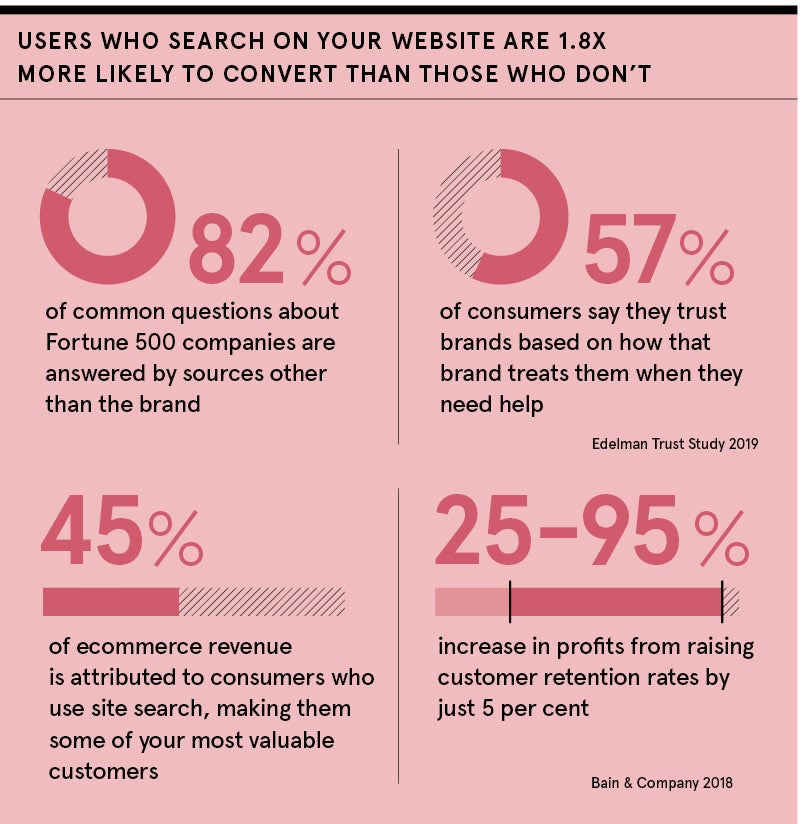The need for accurate, trustworthy information is of huge importance in the digital age when we are saturated with content. At a time of crisis, its role is heightened. COVID-19 is a chilling example of this. As the virus wreaks devastation around the world, people crave urgent answers about everything from health issues to funding, education and supplies.
Take government loans for small businesses. The processes around these are often extraordinarily confusing. At my bank, call waiting times are currently five hours. Many of these callers will have common questions about how to access these loans, yet our retail banking organisations are ill-equipped to provide this information at scale across numerous digital channels.
And consider the statistic that 82 per cent of common questions about Fortune 500 companies are answered by sources other than the brand. Inaccurate information, or even misinformation, can also harm a brand’s reputation.
But it’s not just being present in search. Many people will go directly to a brand’s website to search for the information they need, yet too many companies either don’t have a search function, or rely on outdated technology which indexes on keyword searches, bringing up “blue links” (organic search results) which lack relevance or contain obsolete information.
In a time of crisis, it is even more imperative chief marketing officers understand the customer journey
Not only are many brands failing to deliver accurate, timely information to customers at a heightened time of need, they are negating costly customer acquisition campaigns, undermining the customer experience and risking customer loyalty. In addition, consumers who use site search account for 45 per cent of ecommerce revenue, making them some of the most valuable customers. Brands that don’t act fast risk losing out.
There are tangible cost-savings to be made by providing accurate information too. One of our UK clients is Three, whose call centre was recently being overwhelmed by queries about 5G. We worked with the company to ensure its site answered all the common questions, in many cases removing the need to contact the call centre. This enhanced the customer experience and reduced costs.
Ultimately, brands must learn from Google. Its search capability centres on a knowledge graph which gathers information from numerous sources and uses this to drive search results. Google has transformed search engine optimisation in the last five years. Now, instead of returning blue links, more than 50 per cent of Google searches deliver direct answers.
Every company needs its own knowledge graph. Numerous brands build their own, feeding in multiple pieces of relevant data to inform highly accurate search results, both in search and on their own websites.
Knowledge graphs must be underpinned by a clear data strategy. People often search on unbranded, subjective terms based on intent not keywords, for example “best insurance brand”. Companies need a well-defined process to harness and not haemorrhage this search traffic.
In a time of crisis, it is even more imperative chief marketing officers understand the customer journey. Brands need to tailor their tactics to each touchpoint, delivering the information needed on their own site as well as via third parties such as Google, chatbots and voice.
Again, a data strategy is key, particularly with the growing role of artificial intelligence. Take voice search. Brands can’t control the algorithms used by Alexa, for example, or the customer interface, but they can control the data they supply.
As part of its mission to help businesses tackle inaccurate information, Yext has built a custom website, NoWrongAnswers.com, offering businesses or organisations a free assessment of how well their website answers the most common questions about their brand.
The site is proving very popular and shows there is a pressing need, indeed a responsibility, for brands to deliver factual and up-to-date information to audiences.
We are offering our site search product Answers for free on a 90-day trial to UK organisations. Please visit www.nowronganswers.com
Remember, the truth is out there, but it is up to brands to deliver it.

